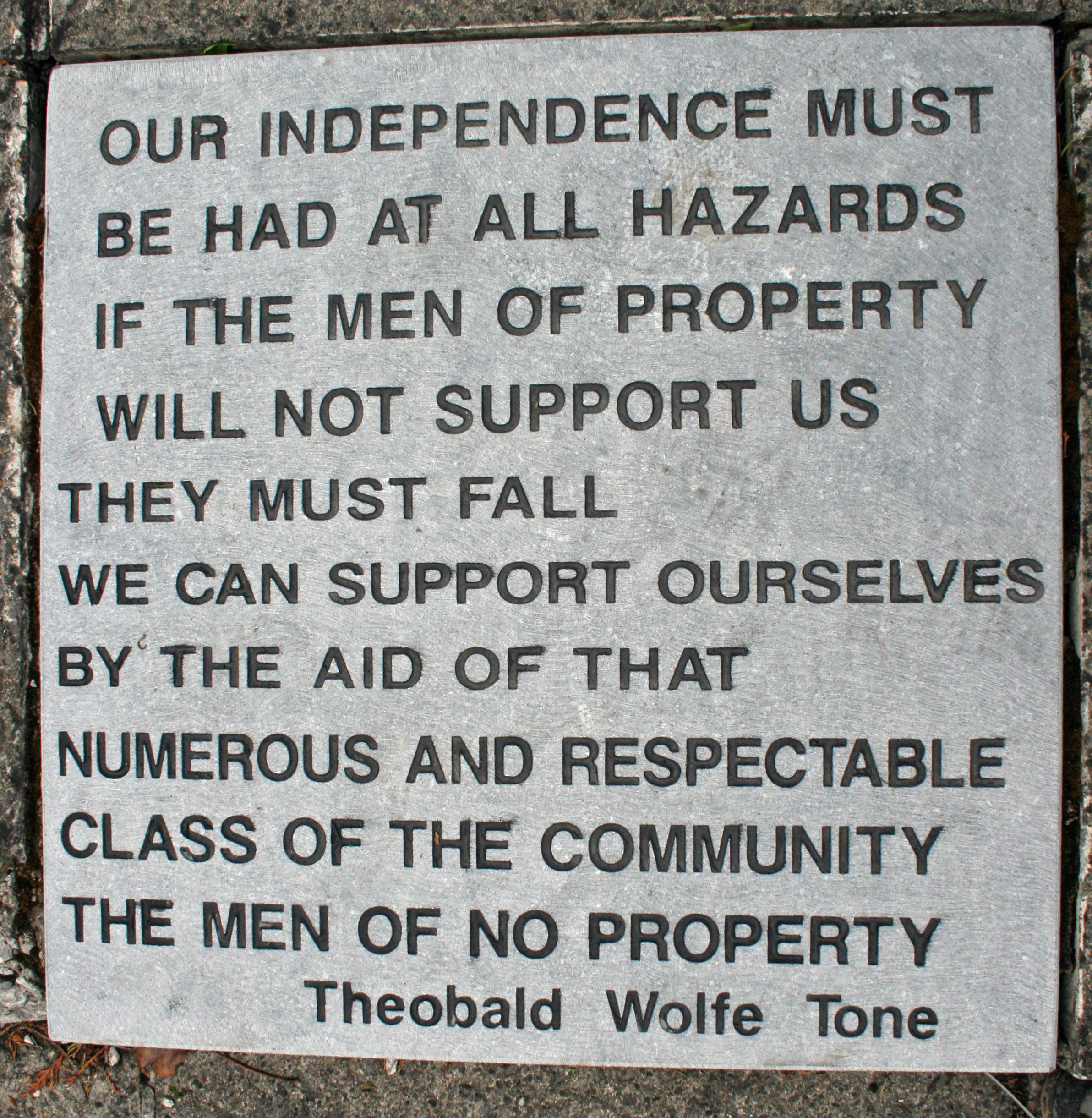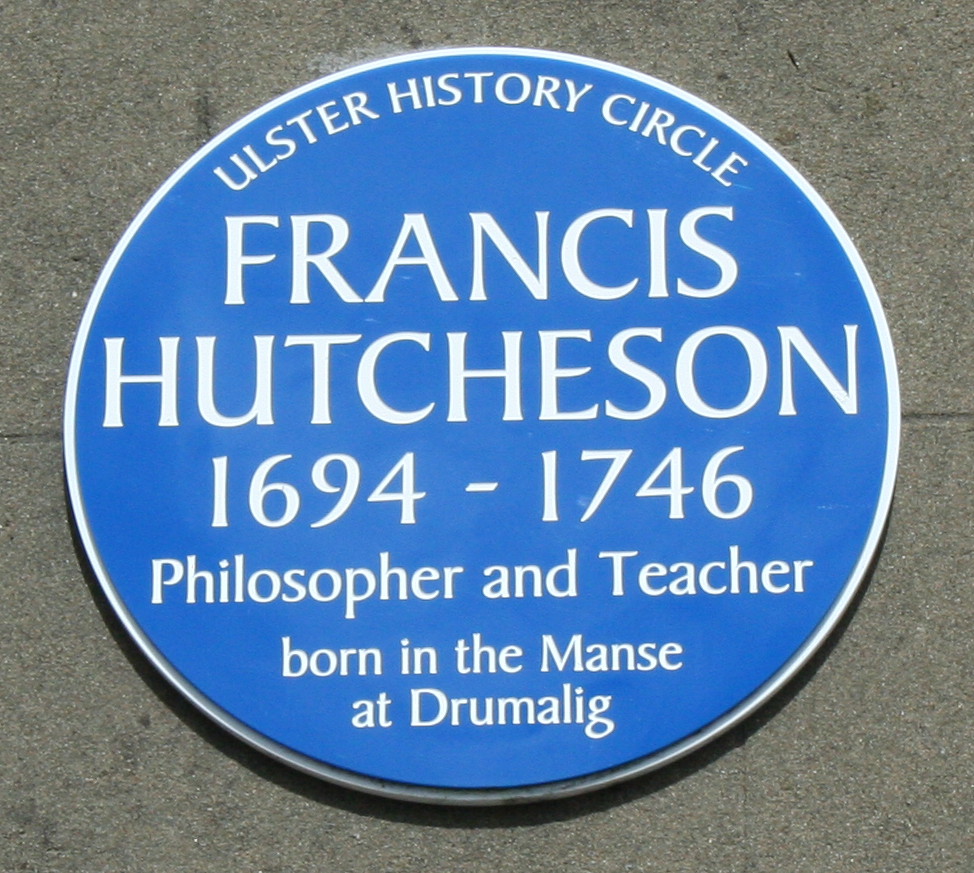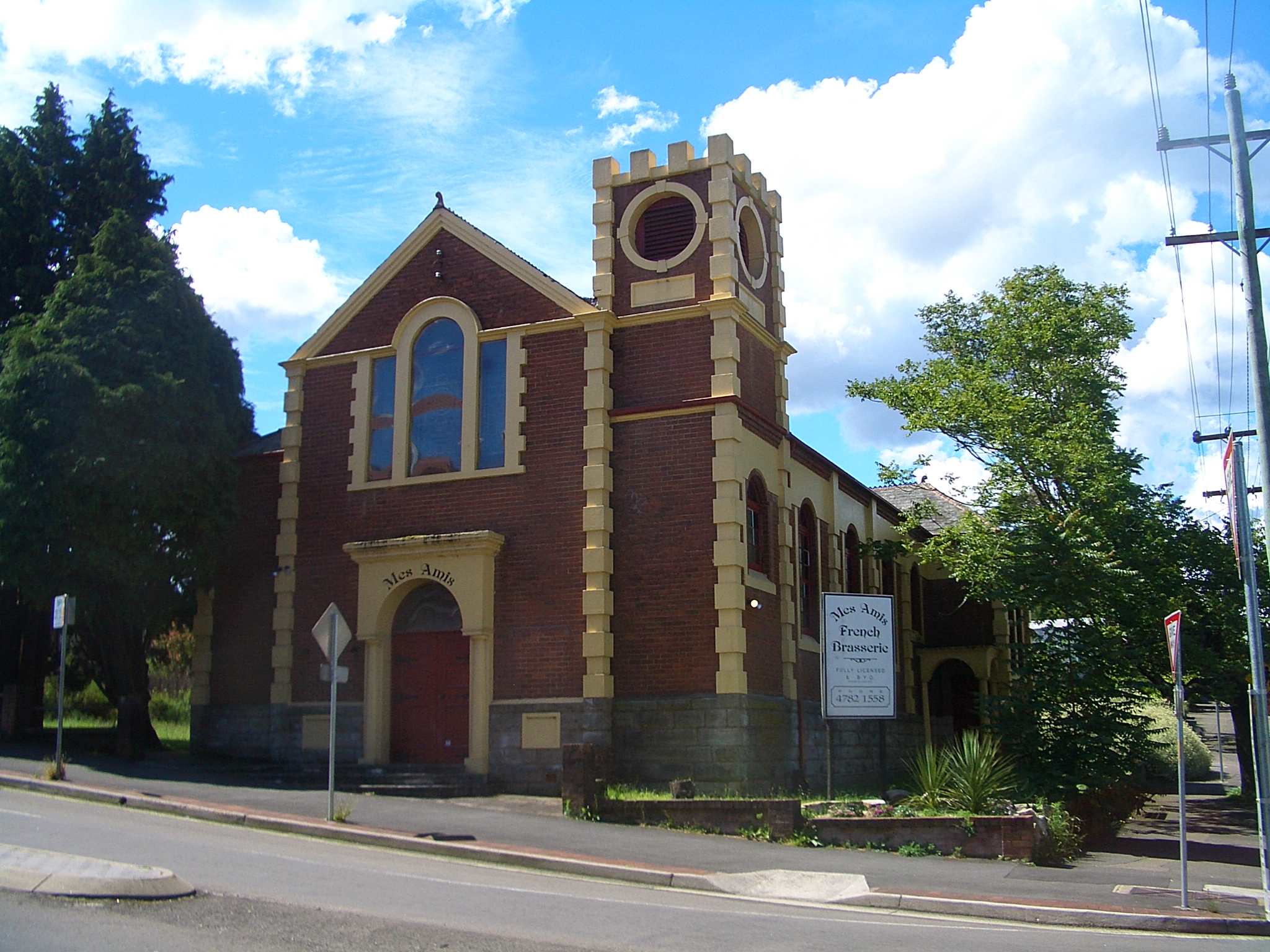|
Wolfe Tone Square
Wolfe Tone Park (), also known as Wolfe Tone Square, is a public space in Dublin, Ireland. It is bounded by Mary Street to the north, Jervis Street to the east, and Wolfe Tone Street to the west. The park is the site of a graveyard that was attached to St. Mary's Church, and is named for Theobald Wolfe Tone (1763–1798), who was baptised in the church. The graveyard was deconsecrated in 1966 and laid out as a green park. From 1998 to 2001, Dublin City Council redeveloped the park as an "urban plaza". The park was closed for further regeneration works in late 2020, and reopened in mid-2022. Churchyard The site, formerly the graveyard of St Mary's Church, was the burial place of the United Irishman Archibald Hamilton Rowan (1751–1834), Mary Mercer, founder of Mercer's Hospital (died 1734), the philosopher Francis Hutcheson (1694–1746), Sir Boyle Roche, 1st Baronet (1736–1807), an Irish politician and member of the Irish House of Commons, and Lord Norbury (1745†... [...More Info...] [...Related Items...] OR: [Wikipedia] [Google] [Baidu] |
Theobald Wolfe Tone
Theobald Wolfe Tone, posthumously known as Wolfe Tone ( ga, Bhulbh TeĂłn; 20 June 176319 November 1798), was a leading Irish revolutionary figure and one of the founding members in Belfast and Dublin of the United Irishmen, a republican society determined to end British rule, and achieve accountable government, in Ireland. Throughout his political career, Tone was involved in a number of military engagements against the British navy. He was active in drawing Irish Catholics and Protestants together in the United cause, and in soliciting French assistance for a general insurrection. In November 1798, on his second attempt to land in Ireland with French troops and supplies, he was captured by British naval forces. The United Irish risings of the summer had already been crushed. Tone died in advance of his scheduled execution, probably, as modern scholars generally believe, by his own hand. Later generations were to regard Tone as the father of Irish Republicanism. His grave in ... [...More Info...] [...Related Items...] OR: [Wikipedia] [Google] [Baidu] |
United Irishmen
The Society of United Irishmen was a sworn association in the Kingdom of Ireland formed in the wake of the French Revolution to secure "an equal representation of all the people" in a national government. Despairing of constitutional reform, in 1798 the United Irishmen instigated Irish Rebellion of 1798, a republican insurrection in defiance of British Crown forces and of Irish sectarianism, sectarian division. Their suppression was a prelude to the abolition of the Protestant Ascendancy Parliament of Ireland, Parliament in Dublin and to Ireland's incorporation in a United Kingdom of Great Britain and Ireland, United Kingdom with Kingdom of Great Britain, Great Britain. An attempt to revive the movement and renew the insurrection following the Acts of Union 1800, Acts of Union was Irish rebellion of 1803, defeated in 1803. Espousing principles they believed had been vindicated by American Revolutionary War, American independence and by the Declaration of the Rights of Man and ... [...More Info...] [...Related Items...] OR: [Wikipedia] [Google] [Baidu] |
Dublin Fringe Festival
The Dublin Fringe Festival is an annual curated arts festival in Dublin, Ireland focusing mainly on theatre. The festival allows artists to submit their work via an application which is subsequently reviewed by the programme manager. The festival is open to both Irish and international participants. The festival started in 1980 as a small independent festival over a weekend and expanded into a sixteen-day festival, annually held in September and focuses on new and emerging artists. The Dublin Fringe has live entertainment as well as performances in dance, theatre, live art, visual art, and music. History The Dublin fringe festival was initially founded in 1980 during a recession and held at various times througout the 1980s without significant media attention or funding. In 1995, Bedrock Productions, with some support from the established Dublin Theatre Festival and Arts office of Dublin City Council, created a revived Dublin Fringe Festival, to "promote and showcase the work o ... [...More Info...] [...Related Items...] OR: [Wikipedia] [Google] [Baidu] |
Hanging Judge
"Hanging judge" is a colloquial phrase for a judge who has gained notoriety for handing down punishment by sentencing convicted persons to death by hanging, or otherwise imposing unusually harsh sentences. Hanging judges are officers of the court with mandates, as opposed to extralegal lynch law. History 17th century * George Jeffreys, 1st Baron Jeffreys * Salathiel Lovell 19th century * Matthew Baillie Begbie, Vancouver and Victoria judge * Isaac Charles Parker, U.S. district judge 20th century * Nikolai Krylenko, Bolshevik revolutionary, prosecutor, and Minister of Justice of the USSR * Roland Freisler, president (presiding judge) of the Nazi ''Volksgerichtshof'' (d. 3 February 1945) * Vasiliy Ulrikh, Soviet jurist, chief presiding judge at the Moscow Show Trials during the Great Purge * Sadegh Khalkhali, Shia cleric of the Islamic Republic of Iran * Manuel Pamaran, presiding justice of the Sandiganbayan in the Philippines from 1978 to 1986 * Maximiano Asuncion, ... [...More Info...] [...Related Items...] OR: [Wikipedia] [Google] [Baidu] |
Lord Norbury
John Toler, 1st Earl of Norbury PC, KC (3 December 1745 – 27 July 1831), known as The Lord Norbury between 1800 and 1827, was an Irish lawyer, politician and judge. A greatly controversial figure in his time, he was nicknamed the "Hanging Judge" and was considered to be one of the most corrupt legal figures in Irish history. He was Chief Justice of the Irish Common Pleas between 1800 and 1827. Background and education Born at Beechwood, Nenagh, County Tipperary, Norbury was the youngest son of Daniel Toler, M.P., and Letitia, daughter of Thomas Otway (1665–1724), of Lissenhall, Nenagh, Co. Tipperary. His elder brother Daniel Toler was also a politician, serving as High Sheriff for Tipperary and also as M.P. for Tipperary. The Toler family was originally from Norfolk but settled in County Tipperary in the 17th century. He was educated at Kilkenny College and at Trinity College Dublin. He lived at Cabragh House on the corner of the present day Fassaugh Avenue and Rathoath Road ... [...More Info...] [...Related Items...] OR: [Wikipedia] [Google] [Baidu] |
Sir Boyle Roche
Sir Boyle Roche, 1st Baronet (October 1736, as cited in Some sources, including earlier versions of the ''Dictionary of National Biography'', give the date as 1743. However, since the later date would make Roche rather young to have served with such distinction – he would have been 15 at the Battle on Snowshoes (and already a lieutenant!), 16 at the Siege of Quebec and 19 at the capture of El Morro – the earlier date seems more reasonable. – 5 June 1807) was an Irish politician. After a distinguished career in North America with the British Army, Roche became a member of the Irish House of Commons in 1775, generally acting in support of the viceregal government. He is better remembered for the language of his speeches than for his politics – they were riddled with mixed metaphors ("Mr Speaker, I smell a rat; I see him forming in the air and darkening the sky; but I'll nip him in the bud"), malapropisms and other unfortunate turns of phrase ("Why we should put ourselves ... [...More Info...] [...Related Items...] OR: [Wikipedia] [Google] [Baidu] |
Francis Hutcheson (philosopher)
Francis Hutcheson LLD (; 8 August 1694 – 8 August 1746) was an Ulster-Scot philosopher born in Ulster to a family of Scottish Presbyterians who became known as one of the founding fathers of the Scottish Enlightenment. He was Professor of Moral Philosophy at Glasgow University and is remembered as author of ''A System of Moral Philosophy''. Hutcheson was an important influence on the works of several significant Enlightenment thinkers, including David Hume and Adam Smith. Early life He is thought to have been born at Drumalig in the parish of Saintfield, County Down, in modern-day Northern Ireland. He was the "son of a Presbyterian minister of Ulster-Scottish stock, who was born in Ireland" but whose roots were in Ayrshire in Scotland. Rothbard, Murray (24 February 2011Francis Hutcheson: Teacher of Adam Smith ''Mises Institute'' (excerpted from ''An Austrian Perspective on the History of Economic Thought'') Hutcheson was educated at Killyleagh, and went on to Scotla ... [...More Info...] [...Related Items...] OR: [Wikipedia] [Google] [Baidu] |
Mercer's Hospital
Mercer's Hospital ( ga, Ospidéal Mercer) was a hospital in Dublin, Ireland. It was converted into a clinical centre and medical library for the Royal College of Surgeons in Ireland in 1991.Mercer's Medical Centre History The hospital has its origins in a leper house and church named St. Stephen's which was established on the site pre- AD and which had come under the jurisdiction of an unnamed religious brotherhood by the late |
Archibald Hamilton Rowan
Archibald Hamilton Rowan (1 May 1751 – 1 November 1834), christened Archibald Hamilton (sometimes referred to as Archibald Rowan Hamilton), was a founding member of the Dublin Society of United Irishmen, a political exile in France and the United States and, following his return to Ireland in 1806, a celebrated champion of democratic reform. Early life Archibald Hamilton Rowan was the son of Gawen Hamilton (1729–1805) of Killyleagh Castle, County Down, in the Kingdom of Ireland, and Jane Rowan Hamilton. He was born in the home of his lawyer grandfather, William Rowan KC, in London, and lived there with his mother and sister for much of his early life. The elder Rowan collected works by republicans of the Cromwellian era such as John Milton, James Harrington, Edmund Ludlow and Algernon Sydney, and by the Irish rationalist philosopher and freethinker, John Toland. These his grandson was to retain in his own extensive library. When his grandfather died in 1767, he inherit ... [...More Info...] [...Related Items...] OR: [Wikipedia] [Google] [Baidu] |
Deconsecrated
Deconsecration, also called secularization, is the act of removing a religious blessing from something that had been previously consecrated by a minister or priest of that religion. The practice is usually performed on churches or synagogues to be rendered to non-religious (secular) use or demolished. See also * Consecration * Desacralization of knowledge * Desecration * Secularization (church property) Secularization is the confiscation of church property by a government, such as in the suppression of monasteries. The term is often used to specifically refer to such confiscations during the French Revolution and the First French Empire in the ..., the confiscation of church property by a government References {{religion-stub Christian worship and liturgy ... [...More Info...] [...Related Items...] OR: [Wikipedia] [Google] [Baidu] |
Dublin
Dublin (; , or ) is the capital and largest city of Republic of Ireland, Ireland. On a bay at the mouth of the River Liffey, it is in the Provinces of Ireland, province of Leinster, bordered on the south by the Dublin Mountains, a part of the Wicklow Mountains range. At the 2016 census of Ireland, 2016 census it had a population of 1,173,179, while the preliminary results of the 2022 census of Ireland, 2022 census recorded that County Dublin as a whole had a population of 1,450,701, and that the population of the Greater Dublin Area was over 2 million, or roughly 40% of the Republic of Ireland's total population. A settlement was established in the area by the Gaels during or before the 7th century, followed by the Vikings. As the Kings of Dublin, Kingdom of Dublin grew, it became Ireland's principal settlement by the 12th century Anglo-Norman invasion of Ireland. The city expanded rapidly from the 17th century and was briefly the second largest in the British Empire and sixt ... [...More Info...] [...Related Items...] OR: [Wikipedia] [Google] [Baidu] |
Wolfe Tone
Theobald Wolfe Tone, posthumously known as Wolfe Tone ( ga, Bhulbh TeĂłn; 20 June 176319 November 1798), was a leading Irish revolutionary figure and one of the founding members in Belfast and Dublin of the United Irishmen, a republican society determined to end British rule, and achieve accountable government, in Ireland. Throughout his political career, Tone was involved in a number of military engagements against the British navy. He was active in drawing Irish Catholics and Protestants together in the United cause, and in soliciting French assistance for a general insurrection. In November 1798, on his second attempt to land in Ireland with French troops and supplies, he was captured by British naval forces. The United Irish risings of the summer had already been crushed. Tone died in advance of his scheduled execution, probably, as modern scholars generally believe, by his own hand. Later generations were to regard Tone as the father of Irish Republicanism. His grave in ... [...More Info...] [...Related Items...] OR: [Wikipedia] [Google] [Baidu] |




_p218_A._HAMILTON_ROWAN.jpg)


